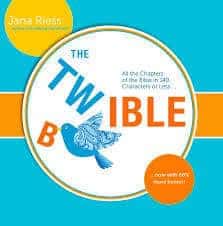 I just received my copy of The Twible: All the Chapters of the Bible in 140 Characters or Less . . . Now with 68% More Humor!
I just received my copy of The Twible: All the Chapters of the Bible in 140 Characters or Less . . . Now with 68% More Humor! by Jana Riess. Riess blogs for Religion News Services and has authored several books, including Flunking Sainthood: A Year of Breaking the Sabbath, Forgetting to Pray, and Still Loving My Neighbor
, named by Publisher’s Weekly as one of the top ten religion books of 2011. She has a M.Div. from Princeton Theological Seminary and a Ph.D. from Columbia University.
The Twible (rhymes with “Bible”) tweets each of the 1189 chapters of the Bible. Not a small task. Think about reading each chapter, summarizing it in 140 characters or less, and being funny all at the same time (Riess feels that making readers pass liquids out of their nostrils should be “the express goal of every writer” p. xii).
Like these:
- Genesis 10: Begat, begat, begat. Name index includes Ludium, Lahabim and Jerah, all now available by prescription. Ask your doctor about Ophir.
- Joshua 5: Second-generation Israelites are circumcised before war. The Bible says they spend a while “recovering in camp” afterward. Gee, ya think?
I often tell students that unless they can tell me in one sentence what their paper or thesis is about, they don’t really own their topic just yet. Summarizing each chapter in the Bible in a tweet, in what amounts to 20-25 words each, forces one to “own” each chapter and get to the overarching point.
And she’s funny, too, which is for more than just entertainment. George Carlin said, and I’m paraphrasing, that comedy is what happens to you every day; comedians just point it out.
 Humor disarms us and gives us a different perspective on the familiar. Riess’s tweets and 50+ original cartoons cannot capture every nuance of every chapter, but she does zero in what too many Bible readers work hard to ignore or suppress: the Bible, especially the Old Testament, has more than its share of sanctioned, condoned, or commanded acts of violence or other things that leave even casual readers scratching their heads.
Humor disarms us and gives us a different perspective on the familiar. Riess’s tweets and 50+ original cartoons cannot capture every nuance of every chapter, but she does zero in what too many Bible readers work hard to ignore or suppress: the Bible, especially the Old Testament, has more than its share of sanctioned, condoned, or commanded acts of violence or other things that leave even casual readers scratching their heads.
For example, tweeting Numbers 31 removes the pretense of entangled and cumbersome arguments for justifying the division of virgins as spoils of war and boils it down to: In Exodus, the Midianites were our friends. But now, God says kill them all (except virgins so we can rape them later). Uh, WTF?
Numbers 31 does not say explicitly that the virgins where divided among the Israelites were to be raped, but the Bible’s silence certainly leaves one wondering if the Israelites were planning on doing with captured virgins what other nations usually do. Riess’s tweet brings the unstated to the foreground. She disarms us. After we laugh for a few moments, we say ugh.
Or the flood (Genesis 9): They’ve de-arked. G sends a rainbow to promise he’ll never again murder us by flood. Keeps earthquakes, tsunamis & hurricans in reserve.
Or Jael (Judges 5): Song of Deborah tops charts: “If I had a hammer!” Jael hammers out justice and freedom…on Sisera’s head. You go, girls.
Or God’s marching orders against the Canaanites (Deuteronomy 7): Rule #1: All indigenous people of Canaan must be destroyed. Rule #2: Don’t marry them. (FAQ: If they’re destroyed, who’s left to marry?)
The Twible also has other features, like dozens of sidebars of lists (e.g., “The Top Five Incestuous Relationships in Genesis,” “Worst Careers If You Want to Remain Biblically Clean” –which includes urologist and vampire). She also has a number of short essays of a more explanatory tone, many of which are conversant with biblical scholarship (look at her endnotes): “Who Wrote the Psalms?,” “Strong Woman” (of Proverbs 31), “The F Word is in the Bible” (Ezekiel’s sexual metaphors in ch. 16), “The Christmas Story” (the differences between Matthew and Luke), “The Pharisees” (not the “bad guys”), “The Love Chapter” (1 Cor 13 is not a wedding passage), “Paul and ‘Paul'” (issues of Pauline authorship).
An honest bit of advice. If you are not the type who likes edgy humor or feels any sort of humor is inappropriate when engaging the Bible, you probably won’t like this book. For others, however, The Twible will prove to be a fun, informative, and challenging resource to have–maybe not on your sermon prep or research book shelf, but at least in the john.
